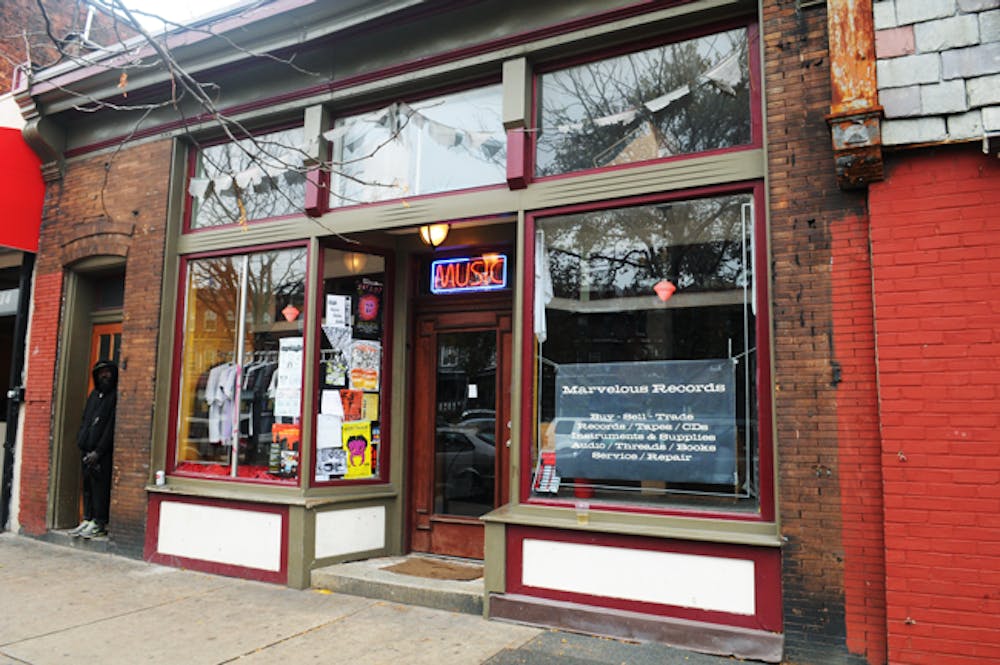A record is music that you can hold. It’s a circular, shiny, black cut of vinyl inscribed with tiny grooves that store sounds. You play it by placing it atop a spinning turntable. The needle grazes its surface, releasing the sound waves into the atmosphere. This process must be repeated when the side reaches its end. In the case of a double album like, say, The Beatles’ “White Album,” the course must be completed four times. At The Marvelous record shop, the “White Album” leans nose–to–shoulder against “Sergeant Pepper’s Lonely Hearts Club Band” in a wooden nook labeled “BEATLES.” This one is priced at $95.
The Marvelous has recently relocated from Penn’s campus to Baltimore Ave., near 49th St. Bryan Martin has worked there for seven years, at both locations. He co–owns a percentage of the store with his business partner, Dave Koch. He spends up to 10 hours per day, five days per week, wading through records. He sells records. He buys records. He cleans records with a round, hairy brush. He handles records between his big, sturdy hands, like pieces of fine china. But his first task every morning is to set the mood for the day — to select a soundtrack for his customers. He does this by hitting “shuffle” on his iPod nano.
He’s a big guy, with a soft beard and light eyes. His voice is low and polite — until I ask about the iPod. “If you weren’t here, I’d be running around like a maniac, and I don’t have time to flip a record over,” he says with some humor, and more annoyance. Fair, but coming from a vinyl connoisseur, it’s disarming. The ability to store files digitally has replaced the need for hard copies of media — not to mention the brick and mortar markets that sell them.
By the very nature of the medium, records refuse to fade to background music. Listening requires active participation: you must get up to flip the record over. “It’s a protest in a sense”, Bryan says, of the physicality of the act, predicting a backlash in the future against what he calls “virtual bullshit culture.” He goes on: “For the most part, it's tough to sell people on that, and in order for people’s sanity to get reoriented, it requires things like getting people to physically pick up a record or do something.” Each record sold is emblematic of this idea.
For background, The Marvelous used to be located on 40th St., in the basement of Smoke’s — yes, that Smoke’s. Despite being just over a mile away from its former home, the re–route is a lesson in contrasts. There’s a park across the street from the new location — small, but neat, and lively after school on a Wednesday afternoon. A man makes his way across, entering the store and wheeling his bicycle to the back without acknowledging us. I assume he’s a regular. Once he starts shelving records, I realize that he works here.
This is Dave. He wears a funny cap trimmed in tribal patterns that turns up at the sides. He’s slight, with nervous eyes and a coy smile. Like Bryan, he’s worked at The Marvelous for years, at both locations. Now he can wheel his bicycle into work without hitch: one perk of no longer being underground. The lack of sunlight at the old location contributed to what Dave designates as a “psychic problem.” There were concrete woes too: leaks from upstairs were flooding the store, ruining thousands of dollars' worth of jazz records. The landlord was rigid. And to top it all off, employees weren’t feeling quite right. Upon move–out, black mold was discovered in the stacks.
Now, things have never been better for The Marvelous, albeit with one exception: “We may be selling a little less Beatles than we were on 40th St.,” Bryan concedes. But “every day is busier than this time last year,” he affirms, estimating that 20 to 100 records are sold per day. I’m somewhat skeptical — the only "customer" I’ve seen so far was selling records. He had Bob Dylan’s “Blood on the Tracks,” plus three David Bowie albums. But after we finish talking, Bryan makes a phone call. “We have a copy of 'Ziggy Stardust.' Would you like us to hold it for you?” Before my visit is over, another one of those Bowie records is gone. And they arrived after I did.
Like the wares it sells, The Marvelous requires participation. It requires patrons. It requires a journey that might be one block or 20. It asks you to search and find, rummage through stacks, put on the well–worn headphones and test spin at the listening station. “The universe didn’t happen from not moving.” Bryan says. “And that’s what all music is — vibrations.” Records are cradled in hands, hung on walls and whirled on turntables at The Marvelous. You move, and so do they.

